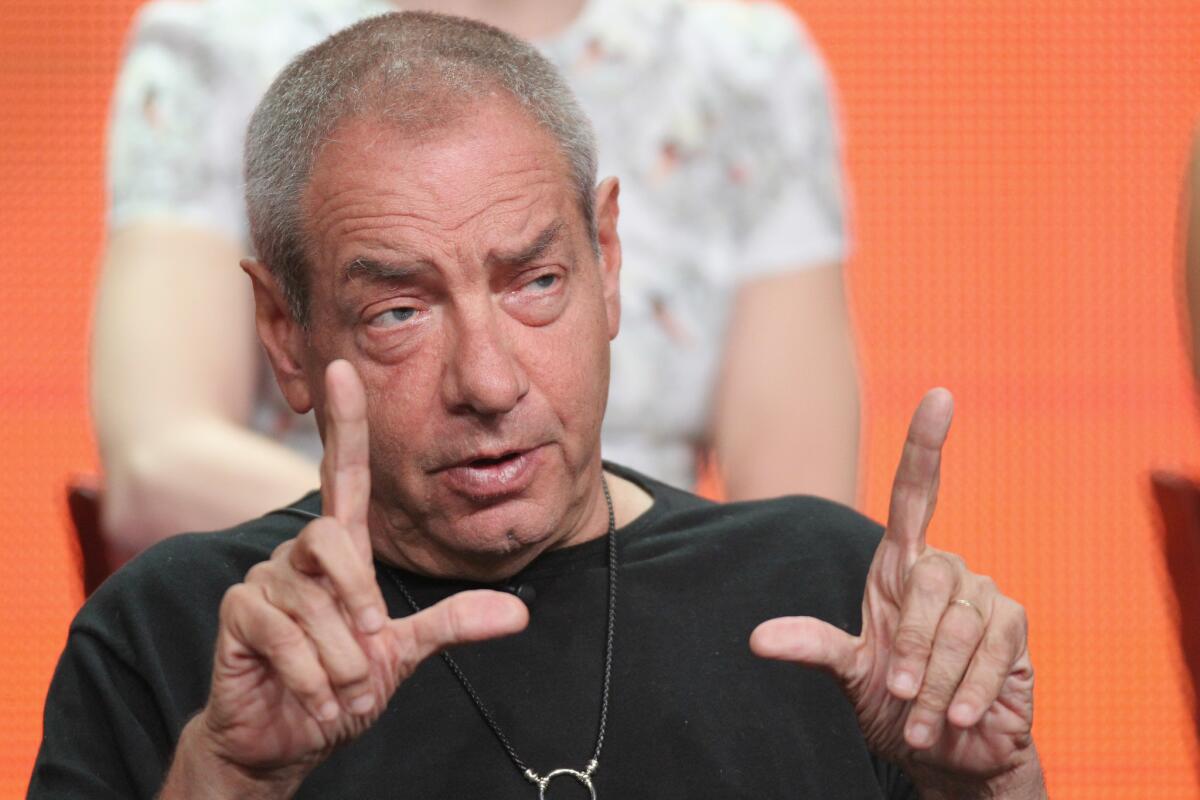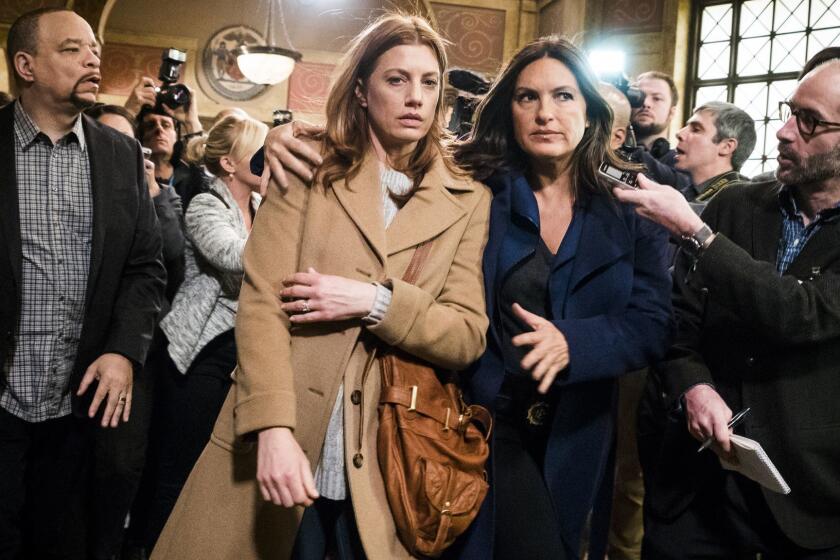News Analysis: Dick Wolf packed TV with hero cops. Critics say that’s part of what’s ‘killing us’

- Share via
As protests over police violence continue across the country, attention has turned to the ways that pop culture — and television in particular — helps perpetuate misperceptions of the criminal justice system.
Mounting public pressure led to the cancellation of the long-running reality show “Cops” on Tuesday, while prominent critics have also called for a radical overhaul of one of television’s most enduring scripted genres — the crime procedural — and well-known actors and producers have begun to reconsider their role in burnishing the image of the police.
Few in the industry are as visible or prolific as Dick Wolf, who as the creator of the ubiquitous and broadly popular “Law & Order” franchise is likely responsible for more hours of law enforcement-themed scripted programming than anyone else on the planet.
Wolf, who currently has five shows airing in broadcast prime time, earned praise this week for his swift firing of Craig Gore, a writer on a recently announced “SVU” spinoff who shared a picture of himself holding a gun and threatened to “light up” people breaking curfew in Los Angeles.
But Wolf’s lengthy track record and outsize influence on the collective imagination have also made him a target of criticism.
In the aftermath of George Floyd’s death, we dig into Color of Change’s study of crime TV shows’ harmful treatment of race, policing and criminal justice.
“The networks cannot be let off the hook for continuing to give him carte blanche to produce content that contributes to all the things that are killing us,” said Rashad Robinson, president of Color of Change. Earlier this year, the racial justice advocacy group published a report called “Normalizing Injustice: The Dangerous Misrepresentations That Define Television’s Scripted Crime Drama.”
A collaboration with the USC Annenberg Norman Lear Center, the study of 26 popular crime dramas found that the “genre glorifies, justifies and normalizes the systematic violence and injustice meted out by police, making heroes out of police and prosecutors.” The report noted that 21 of the 34 prime-time dramas that aired on the four main broadcast networks on the fall 2018 schedule were series focused on crime and law — more than 60%.
Most of these shows are set in racially diverse cities but have disproportionately white writers rooms. They nearly all employ former police officers as consultants and tend to downplay — and in some cases, excuse — the prevalence of police violence against Black people.
And Wolf is responsible for a significant number of those hours. In addition to “Law & Order: Special Victims Unit,” the longest-running live-action drama in prime-time TV history, he currently has four hourlong dramas on the air: a trio of Chicago-set procedurals that constitute NBC’s entire Wednesday-night lineup (“Chicago Fire,” “Chicago Med” and “Chicago P.D.”) and the CBS drama “FBI.” He’s also developing a number of “Law & Order” spinoffs, including one about hate crimes.
According to “Normalizing Injustice,” Wolf’s shows have some of the least diverse writers rooms in the crime genre. As recently as the 2018-19 season, “SVU” had no writers of color; it now has two. “Chicago P.D.” has one Black writer. “SVU” also showed “good guy” characters doing wrong in order to catch criminals far more often than “bad guys” — a phenomenon that helps normalize police misconduct, according to Color of Change — and was less likely to show a person of color as the victim of a crime.
Ever the salesman, Wolf has not been shy about trumpeting the positive social impact of his shows, particularly “SVU,” which has been credited with shifting the conversation around sexual assault. (“We’ve been doing #MeToo for 20 years,” he told The Times in a 2018 interview.) Last week, as many in Hollywood were making donations to show their support for Black Lives Matter, his company, Wolf Entertainment, pledged $1 million to the Alliance for Children’s Rights.
Yet Wolf has also consistently brushed off the suggestion that his shows contain political messages — implicit or explicit.
“If you go back over the years you can’t find evidence of anything I’ve done being politically oriented. If you do that 50% of the audience is [angry] from the first frame,” Wolf told reporters at the Television Critics Assn. press tour in 2018 when he was promoting “FBI” — a drama that debuted at the height of tensions between the Trump administration and the intelligence community over Russian interference in the 2016 election. (Wolf was not available to comment for this article.)
Robinson, though, said: “You have to walk with blinders on to believe that you can be apolitical. He has shows about crime and justice and district attorneys and judges and elected officials inside of black and brown communities, but he believes they’re ‘apolitical.’ He has all-white writers rooms on shows that are set in cities like New York, but they’re ‘apolitical.‘ Then folks will call Ava [DuVernay, creator of “When They See Us”] ‘political.’ We have to disrupt this idea that a rich white man who clearly has had to have his head in the sand for maybe his whole life could think he could produce these shows and they could be apolitical.”
On a Manhattan sound stage masquerading as a Rikers Island interrogation room, Mariska Hargitay acted out a tense scene as Lt.
The Color of Change report identifies the 1990 premiere of “Law & Order” as a a turning point in the history of television. It was once commonplace for legal dramas to center on defense attorneys (“Perry Mason,” “Matlock”) and other champions of the innocent (“Murder She Wrote,” “Highway to Heaven”), but in the early ‘90s detectives, prosecutors and district attorneys became the heroes. “Now, the prevailing concern was all about protecting the innocent, defenseless public from the scourge of crime and terrorism, not about protecting the innocence of those wrongly accused,” according to the study.
“Law & Order,” which ran for 20 seasons on NBC and remains ever-present in reruns, featured authentic character actors such as Jerry Orbach playing salty, no-nonsense beat detectives. Filmed on location in New York at a time when that was still rare, it felt unusually gritty and authentic for network TV. The pulpy series opened with an explanation of the criminal justice system that was as irresistible as it was misleadingly simple: “In the criminal justice system, the people are represented by two separate yet equally important groups: the police who investigate crime, and the district attorneys who prosecute the offenders. These are their stories.” “Law & Order: SVU,” a spinoff about sex crimes, premiered in 1999 and made a feminist folk hero of Olivia Benson, an empathetic NYPD detective played by Mariska Hargitay.
The name of the franchise happens to be a phrase that was popularized by conservative politicians in the 1960s, most famously Richard Nixon, and often deployed as a racist dog whistle. It has also become President Trump’s favorite rallying cry in recent weeks as he searches for a galvanizing message for his imperiled reelection campaign (and prompting former “SVU” star Chris Meloni to fire back at Trump on Twitter: “You would be arrested!”)
“Law & Order” premiered at a time of high crime in the United States, much of it related to the war on drugs. But, as Robinson notes, violent crime has steadily declined over the last 20 years “while most Americans, according to Pew Research and others, believe that crime is going up. So there is a gap between perception and reality, and the gap between perception and reality is definitely related to the images they’re getting in their homes every day. So that makes it harder for us to push for change if they think that right around the corner is someone who is going to harm them, and so the ends justify the means.”
As the report notes, even the idea that most defendants go to trial — the way they do like clockwork in the second half of nearly every “Law & Order” episode — rather than caving to pressure to accept a plea bargain — as they are likely to face in real life, especially if they are people of color — is fundamentally misleading and feeds the notion that the criminal justice system is efficient and evenhanded. (According to the National Assn. of Criminal Defense Lawyers, 97% of criminal cases are resolved through plea deals.)
Reflecting this reality presents a major challenge to showrunners of crime procedurals, which almost by definition depict law enforcement as more successful and effective than it actually is.
As critic Alyssa Rosenberg noted in a piece for The Washington Post, portraying law enforcement realistically would mean that “audiences would have to be retrained to watch, for example, a version of ‘Special Victims Unit’ where the characters cleared only 33.4% of rape cases, or to accept that in almost 40% of murders and manslaughters, no suspect is arrested.”
In an interview with the Hollywood Reporter last week, “SVU” showrunner Warren Leight spoke about the changes he was planning to make at the drama, which has been renewed through Season 24. Since returning to the show last year, he has pushed to make the writers room more inclusive and sought input from advocates for criminal justice reform. He has a meeting with representatives of Color of Change scheduled in coming days.
“A lot of our storytelling is from the point of view of the victims … we have not spent as much time thinking about those accused of crimes,” said Leight, who has expressed his support for protests over the killing of George Floyd by Minneapolis police and championed other liberal causes on Twitter.
Leight also acknowledged that his show presents an unrealistic view of law enforcement — “We are trying to depict how justice should be handled for victims and for perps,” he said.
Every showrunner who portrays the criminal justice system struggles with whether to portray things as they are and the way they ought to be, but recognizing the gap between the ideal and the flawed reality may be the first step to eliminating it.
More to Read
The complete guide to home viewing
Get Screen Gab for everything about the TV shows and streaming movies everyone’s talking about.
You may occasionally receive promotional content from the Los Angeles Times.







